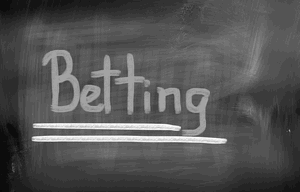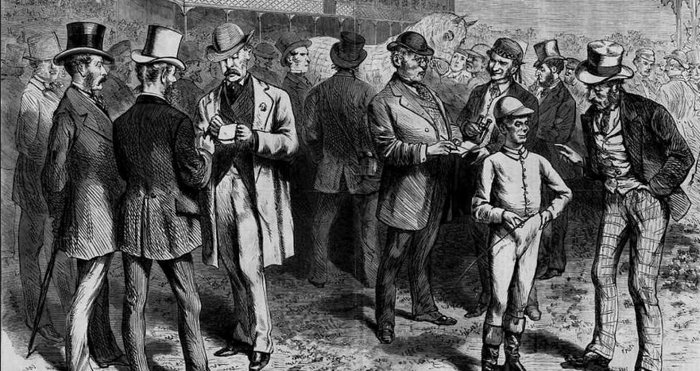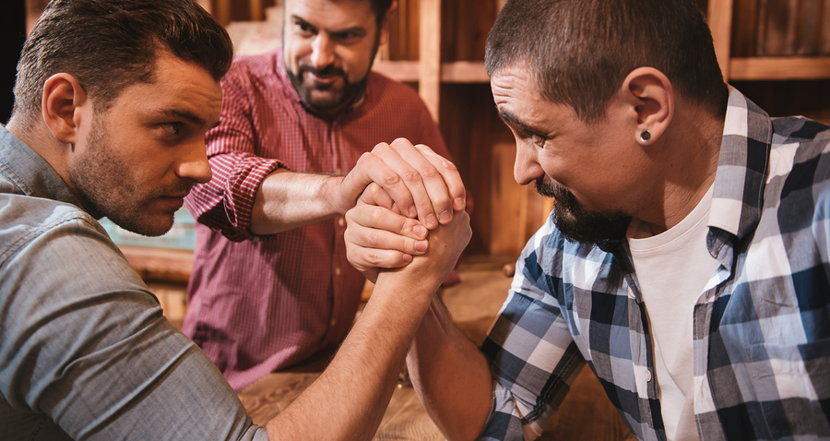 When we talk about gambling, it’s easy to think in strict terms about the likes of casinos and bookmakers. In reality, however, gambling is a far more wide-ranging topic that can creep into every day life in the decisions that we make. That can be the obvious, such as ‘betting’ with a friend that you can make it to the end of the road before them, or it can be less obvious moments.
When we talk about gambling, it’s easy to think in strict terms about the likes of casinos and bookmakers. In reality, however, gambling is a far more wide-ranging topic that can creep into every day life in the decisions that we make. That can be the obvious, such as ‘betting’ with a friend that you can make it to the end of the road before them, or it can be less obvious moments.
If you’ve ever decided to drive through a set of traffic lights when they’re midway between amber and red, for example, then you’ve done a bit of gambling. Anyone who’s ever flipped a coin to help them make a decision has gambled on the outcome of the situation that they’re involved in. The point being that gambling isn’t just something that happens when you’ve got a deck of cards, a roulette wheel or a choice of horses in front of you, and it isn’t always done for money.
Is gambling just part of human nature, then? Are we all gamblers deep down, at least to some extent, it is after-all just a form of risk management? Some people take it so seriously that they’ve been able to make a profession out of it. Others, on the other hand, struggle with their relationship with gambling and have needed to withdraw themselves from betting money on things entirely.
This article will explore the various reasons why people are willing to risk losing money in order to win some more, as well as looking at how our relationship with gambling has developed over the years. It is not a scientific piece, nor should it be looked on as having any weight in the academic world. It will, however, give you a starting point for research if the topic is one that you find interesting, with sources cited where possible.
History of Gambling?

When looking at why people enjoy having a flutter, the first place to start is surely with the history of the topic. Is it a relatively recent phenomenon, or have we gambled for as long as it’s been possible to do so? The answer is very much the latter, with evidence suggesting that human beings have gambled since the days of the Paleolithic period. A six-sided dice existed in Mesopotamia and that was based on astragali from thousands of years earlier.
The Chinese have long had a relationship with gambling, having gambling houses in the first millennium BC and also regularly betting on fighting animals. That’s also where playing cards first came about, being invented in the ninth century. Even the most popular of modern games have a history that traces back far earlier, such as poker being a derivation of the seventeenth century Persian game known as As-Nas and a casino being opened in Venice, Italy in 1638.
The more that gambling became prevalent, the quicker governments and local councils were to ban or limit it. They began to either outlay it entirely or else charge tariffs and taxes on gambling. The problem with that method was that it didn’t deter people, instead driving them to what became areas of ‘gambling tourism’. This, perhaps more than anything else, is perhaps evidence that people have an innate desire to have a flutter even when they’ve been told that it’s illegal or immoral. You can read a more detailed article on the history of gambling in our betting guides section.
What Is Gambling?
 Before we get into why people gamble it helps to explain exactly what gambling is. The modern use of the term ‘to bet’ or ‘to gamble’ is now taken to specifically refer to playing games of chance or predicting the outcome of an event for money. The older and more general definition however is simply to take a risk in the hope of a desired result, and based on that interpretation everyone in the world gambles to a degree.
Before we get into why people gamble it helps to explain exactly what gambling is. The modern use of the term ‘to bet’ or ‘to gamble’ is now taken to specifically refer to playing games of chance or predicting the outcome of an event for money. The older and more general definition however is simply to take a risk in the hope of a desired result, and based on that interpretation everyone in the world gambles to a degree.
It is hardwired into animals to assess risk and reward, but as humans we can do this on both an unconscious and conscious level. We’ve evolved, like all animals, to take risks that maximise reward and minimise harm but in relation to how much we need that reward. Every single day we all assess risk, decide on a course of action and then take it. The thing is we are not a homogeneous race and therefore we all have different attitudes to risk vs reward and therefore we make different decisions based on that. In basic terms this is why some of us like to bet for money and some of us don’t.
The problem with gambling for money is it is often less tangible than wagering for food or resources, as we have evolved to do. The idea of what we ‘need’ money for is a far more abstract and complicated question than many people consider, and this is one reason why attitudes to gambling and its effects are so diverse.
Whether we gamble for money or not the fact is some of us are better at assessing risk than others and therefore naturally some people are better at choosing how to bet. Assessing attitudes to reward is not as logical and so is far harder, and this is often where problems arise when gambling, as some people, whether they are good at betting or not, can become addicted to the process losing sight of the overall picture. Others meanwhile can take a more objective approach to risk and reward and even use subtle differences in the thing they are betting on to make money. Most of us in reality like a flutter because it adds excitement to an event or an environment, we don’t necessarily think we will win but it’s a great feeling when we do.
Different Types of Gambler

If we know that people are willing to risk breaking the law in order to gamble, the natural follow-up question becomes ‘why?’
The answer, of course, isn’t an easy thing to find. The startling point is perhaps to look at the different types of people that exist when it comes to gambling. There’s no hard and fast rule on this front, but here’s how I see it:
- Aren’t Interested Whatsoever
- Occasionally Have A Flutter, Maybe The Grand National or the World Cup
- Bet Regularly, Perhaps A Weekend Football Bet or Race Meeting
- Bet All Of The Time, Pretty Much Daily
- Can’t Not Bet, Whatever The Market, Day or Night
- Bet Professionally
- Play Bingo and Skill Games, They Don’t Think They Are Gambling But They Are
Each of those descriptors is at least partially self-explanatory, but I’ll have a quick look a them in turn for the purposes of clarification. There are plenty of people that don’t have any interest in gambling whatsoever. Sure, they might tick the box of being a ‘gambler’ from a life-risk point of view, in the sense of driving through a light when it’s in the middle of changing, but they wouldn’t bet money on the outcome of an event that they don’t have control over. As far as they’re concerned, gambling just isn’t a ‘thing’.
They are not dissimilar to those who only bet occasionally. This is a group of people that includes the likes of those who don’t normally gamble but might buy a lottery ticket if it’s a rollover or place a bet on the Grand National because they ‘always have’. Perhaps if they were in a casino they might stick £1 down on the roulette wheel and then be devastated if the bet loses and so decide not to return. They don’t have any objection to gambling, they just don’t do it all that often.
Next up are those that bet regularly. This isn’t people who would be described as having a ‘problem’ with gambling, but they perhaps place an accumulator on the football results every single weekend, even if it’s only a couple of quid. They’ll know when the major horse races are in the calendar and will have ‘techniques’ for taking on the casino. They’ll normally set themselves a budget and gamble within their means, using their winnings to place more bets rather than pay for stuff that they want.
From there the next step is to people who place a bet on anything and everything. They have a Direct Debit for their lottery numbers, earn money from bookmakers for their loyalty and place bets on every football match that takes their fancy. They’ll study the form guide when it comes to horse racing and will be able to tell you the trainers that have had the most joy on any given racecourse. For these people the experience is as much about the ritual of betting as it is the possibility that they’re going to win big.
It’s then only a small jump to the people that you’d perhaps say have a ‘problem’ with gambling. They spend money that they don’t have, throw good money after bad and will bet on anything they’re offered in the hope of winning back money that they’ve lost in the past. My dad used to run a building company and would tell me about people who collected their wages on Friday and would head straight to the bookmakers to bet it all. If their wager was a winner then they’d have a good week, but if it was a loser then they’d struggle to make ends meet.
Then there are those that bet professionally. They’ve usually got a niche, such as being a pro-poker player or knowing the world of horses inside out. The difference between these people and those with a ‘problem’ is that they bet analytically rather than passionately. Even the biggest Manchester United supporter in the world would be willing to bet on Liverpool if he thought that the stats and evaluations suggested a loss for the Red Devils.
These people don’t bat an eyelid at the idea of having to place bets in the tens of thousands of pounds for just a relatively small increase in profit. They’ve done their homework and know the bet is good, they also play the bookies off each other to ensure they win, although as a consequence they get banned from most of them. In many ways the difference between a professional and someone with a problem all comes down to whether you win overall or not. Many ‘professionals’ over time can quickly turn to ‘problem gamblers’ and vice versa.
The last category is an interesting one, those that play games in arcades or most popularly bingo. Often these people claim they do not gamble, in fact ‘”is bingo gambling?'” is one of the most searched terms about the game, but in reality bingo and arcade games are gambling. The stakes may be low and the games aimed at ‘having fun’ or ‘socialising’ but in reality when you bet for money it is always gambling. Even the church and religious groups that bemoan the effects of gambling will be happy to host a bingo night or a raffle to fund the new roof. The issue here can often be escalation, as with drugs there can be a tendency to move onto the harder stuff, and for this reason bingo and games sites will often push casino games at the side to tempt people.
Why Do People Bet?
 Knowing the various types of gambler that exist is one thing, but understanding why those that fit into each category are willing to place a bet is something else entirely. For professional gamblers the answer is obvious; they believe that they’ve seen a gap in the market or a ‘guaranteed’ win and willing to exploit it for profit. Likewise for those that only have a flutter every now and then, the answer is normally because it’s ‘a bit of fun’ or they’re hoping to strike it lucky. There have been thousands of winners of the National Lottery since it began, with a good number of them not having done much gambling before.
Knowing the various types of gambler that exist is one thing, but understanding why those that fit into each category are willing to place a bet is something else entirely. For professional gamblers the answer is obvious; they believe that they’ve seen a gap in the market or a ‘guaranteed’ win and willing to exploit it for profit. Likewise for those that only have a flutter every now and then, the answer is normally because it’s ‘a bit of fun’ or they’re hoping to strike it lucky. There have been thousands of winners of the National Lottery since it began, with a good number of them not having done much gambling before.
On that note, it’s funny how some people accept certain types of bet as though it’s ‘not really gambling’. People that wouldn’t dream of betting on greyhound racing or paying blackjack in a casino are more than happy to spend money on the lottery every week. That’s because one of the key reasons that a chunk of people bet is to win. The lottery is a case in point. Few people who gamble for the thrill will bet on the lottery because it’s not about how much money they earn, it’s more about the excitement of placing a bet and seeing how it pans out. The lottery is far too dispassionate for those people, so they don’t do it.
That thrill of placing a bet is a huge appeal to some. There’s a moment when the ball has left the croupiers hand to spin around the roulette wheel or a card has been picked up from the deck when the excitement is palpable, when the possibilities are seemingly endless. Your heart beats faster, your palms sweat and you have a rush of endorphins that are unlike anything you’ve experienced in most other forms of life. It’s a genuine physical reaction, which is why people do it again and again. Much like with drugs, however, the excitement begins to wear off. The only way of getting it back is to bet more and more money, increasing the risk but also ensuring that hit of adrenaline returns. It’s no wonder that those of a certain personality type run the risk of being addicted.
It is important to mention at this point that if you are reading this page because you think you have an issue with gambling then there is a lot of legislation in place in the UK to ensure that operators provide a safe environment. For this reason tools exist such as deposit limits, time limits and self-exclusion to help give you more control of how and when you bet and how much with. There are also many independent and publicly funded bodies available to help you or talk with you if you need the. You can read more about responsible gambling on our dedicated page or visit GamCare for more advice on why people gamble.
My Personal Gambling Story
 I have my own experience of being a ‘problem’ gambler, though I’m pleased to say that I came out the other side of it. I used to live in London and, as many of you will know, that can be an expensive thing to do. I didn’t have a ‘normal’ job, working varied hours in a type of employment that was sporadic. I was also a young guy that liked a drink and, as a result, I would frequent casinos as they were the only places that still served alcohol in the early hours.
I have my own experience of being a ‘problem’ gambler, though I’m pleased to say that I came out the other side of it. I used to live in London and, as many of you will know, that can be an expensive thing to do. I didn’t have a ‘normal’ job, working varied hours in a type of employment that was sporadic. I was also a young guy that liked a drink and, as a result, I would frequent casinos as they were the only places that still served alcohol in the early hours.
It was when in a casino drunk one night that I decided to bet all of the money I had on me, which was a few hundred quid, on the roulette. I won, taking home thousands of pounds and being able to live relatively comfortably for a time. Given that I’d achieved this when drunk, I began to think that I’d have an even better chance of winning when I was sober and began to frequent the casinos on a regular basis. Regrettably, I do not have an analytical mind. If I saw that the roulette wheel had come up red ten times in a row I would bet heavily on black, failing to realise that every time the ball was spun was as though for the first time.
Soon my winnings were entirely depleted and I was starting to eat into money that I didn’t have. I would lose at blackjack or three card poker and head straight to the cash machine for more money, trying to win back that which I had lost. I would then lose again and so bet more money, believing that when I eventually did win I would be able to clear my debts. I remember quite distinctly using my credit card to take out the last £1,000 I had in the world and, even as I wondered what I would do if I lost, placing it down on the roulette wheel on a single number. The wheel span around and my heart pounded, knowing I was essentially homeless if it didn’t land on my number.
Thankfully it did, allowing me to clear most of the debt that I had worked up over the preceding weeks. Yet it was unquestionably a wake-up call for me and I realised that I had a problem. In betting money that I didn’t have and couldn’t afford to lose, I put myself in a position where I might have lost everything – including the respect of my family and friends. I vowed never to do that again and, fortunately enough, never have. I still place a bet every now and again but it’s only with money that I can afford to lose. I recently went to Las Vegas on a friend’s stag do and left at the end of the week without having bet a single dollar. As I said before, though, I know that I’m lucky that I didn’t end up falling further into debt.
This section is written from the personal perspective of the author of this page.
Reasons Why We Gamble

A piece by Psychology Today explored the reasons why people gamble and came back with the answer that is no one reason for it. It’s believed that older people tend to enjoy gambling on things that require less thought and decision making, hence bingo being so popular with the ‘golden generation’. There’s also a difference in the choices made by male and female gamblers, with stereotypes coming into play. Women tend to prefer games that are a matter of chance, whilst men will opt for skill-based games when possible. The article cites poker as an example, with men often attempted to impose a level of skill on it even though it as much about chance as anything.
Another observation made by the article is that people don’t always gamble for the same reasons. Some might have initially begun gambling because it was fun and, in the case of something like a trip to the bingo or a visit to a casino, but after a time it might develop into a ‘preoccupation with winning money and chasing losses’. Biological, psychological an social issues all come into play when trying to identify why someone gambles, meaning that pointing to just one factor is misleading. Even the types of gambling that people do will have different reasoning behind it, with those betting on the lottery hoping for a life-changing experience and those having a wager on football perhaps hoping to make a game they have no other investment in more interesting.
The article makes the point that the idea of gambling for profit is flawed, given that most people other than those that are analytical in their approach behave in a way that goes against the idea of making money. The majority of gamblers will reinvest the money that they’ve won in more bets, rather than putting it to one side and continuing to bet with the initial seed money. There’s also the fact that not all of the rewards in gambling are monetary. Sometimes it can be a matter of ‘beating’ a better player or ‘getting one over’ on a bookmaker. This sense of pride can be just as influential to some gamblers in their decision making as the possibility of getting more money, even to the point of people making poor decisions just to ‘win’ against a skilled opponent.
Gambling Can Be Fun and People Do Win
 Perhaps there’s an extent to which I’ve painted a bleak picture of gambling in this article, but the reality is that not every story is a negative one.
Perhaps there’s an extent to which I’ve painted a bleak picture of gambling in this article, but the reality is that not every story is a negative one.
Much as I got lucky when my final bet with my last £1,000 came up a winner, so too do many people also hit the big time through gambling.
Those that are against gambling as an activity might encourage abstinence, but the idea that everyone loses is factually incorrect.
Yes, in real terms the ‘house always wins’, but that’s in the sense that there are thousands of people who pass through the doors of a casino every week and the number of winners will be balanced out by the number of losers. The house’s edge just guarantees them a profit, not that everyone will lose.
Here are some examples of people who have been luckier with their betting than others:
Horse Racing
Fred Craggs, a Yorkshireman, won £1 million in 2008 when his 50p bet on an eight horse accumulator came home. Given one of the horses was named ‘Isn’t That Lucky’ and another was called ‘A Dream Come True’, you could say that his bet was fated to be victorious.
In 1996 a man from Morecambe named Darren Yeats had one person in particular to thank for winning more than half a million pound. He’d bet £59 on Frankie Dettori winning all seven races in a meeting at Ascot at odds of 25,000/1.
Football
Can you really dream yourself into a win? That’s what happened to Adrian Hayward in 2006 when he dreamt that Liverpool’s Spanish midfielder Xabi Alonso would score from the halfway line during the season ahead. He bet £200 on the unlikely event occurring at odds of 125/1 and took home £25,000 when Alonso did just that against Luton in the FA Cup.
Another punter might have thought he was dreaming when he bet £5 on Mali making a comeback against Angola, despite the Africans being 4-0 down with ten minutes to go. The odds were 1,000/1, so when the scoreline somehow ended up 4-4 he took home £5,000.
F1
Formula 1 star Lewis Hamilton might not be everyone’s cup of tea, but one fan of the sport saw him karting when the future star was just thirteen-years-old and was so impressed that he placed a £100 bet on him becoming a superstar before he was twenty-five. When he then won one of the sport’s biggest trophies the punter picked up £125,000.
Lottery Wins
There are numerous different lotteries based around the world, with those in America often offering the biggest prizes. Things operate slightly different in the States, however, with lottery winners having to pay tax on their winnings and often not receiving the money that they’ve won in one lump sum. For that reason I’m going to limit myself to British winners of either the Lotto or EuroMillions.
One such example is that of Mr and Mrs Weir, who won more than £160 million in 2011. The couple from Ayrshire ended up richer than Ringo Starr, buying a mansion and a fleet of cars with their winnings. They weren’t entirely selfish, though, also giving £1 million to help clear the debts of Partick Thistle and the same amount to the National Theatre of Scotland.
Things didn’t work out quite as well for Mr and Mrs Bayford of Suffolk after they won just shy of £150 million the following year. Just fifteen months after the enormous win the couple broke up, with Adrian Bayfield getting engaged to a local stable girl. That didn’t last either, though Gillian Bayfield was more fortunate in her new relationship with a car salesman.
Gambling and Crime
 Whether you like it or not not everybody gambles for the excitement created or because they want to win more than they have to start with. Some more unscrupulous people will gamble in order to clean up the proceeds of crime or indeed will illegally cheat in order to defraud a bookmaker or casino. This is the nature of an industry that gives people potential access to large sums of cash with relative ease.
Whether you like it or not not everybody gambles for the excitement created or because they want to win more than they have to start with. Some more unscrupulous people will gamble in order to clean up the proceeds of crime or indeed will illegally cheat in order to defraud a bookmaker or casino. This is the nature of an industry that gives people potential access to large sums of cash with relative ease.
There are plenty of examples where groups or individuals have fixed markets or cheated the system to make money. We would like to think most get caught, but it is hard to know how many do not, certainly not enough to make the potential rewards not worth the risk for criminals. In reality this type of crime is at a relatively low level, especially with modern digital detection methods to spot unusual betting activities.
Fraud on the other hand will always happen and gambling companies are fined every year because of it. There are strong laws and and enforcement in the UK but the rewards from the practice remain high enough that criminals still do it. For example, in 2018 FOBTs (Fixed Odds Betting Terminals) in shops were limited from £100 stake to £2. This move was largely made to protect vulnerable gamblers, and that is true but in reality at least some of the motivation behind the move was to reduce fraud. For decades criminals have been using these machines to launder money quickly in high volumes on games that can guarantee a payout rate of up to 98%.
To be able to put dirty money in and get back, on average, over 95% of what you’ve put in as clean traceable cash, you can clearly see why it is such a targeted industry. The move to online gambling is helping more and more to control this as betting with large amounts of cash is becoming harder, then again they will always find new ways to exploit the system.
Online Gambling
 Gambling has never been so easy from accessibility point of view. Online gambling, on mobile especially, has opened up the ability to place a wager any time of day or night, pretty much anywhere. This is combined with the fact there is much more to actually bet on, I mean before the internet you would struggle to have placed a bet on Korean football, well that’s now no harder than betting in the Premier League. This trend is only going to get easier in the future too.
Gambling has never been so easy from accessibility point of view. Online gambling, on mobile especially, has opened up the ability to place a wager any time of day or night, pretty much anywhere. This is combined with the fact there is much more to actually bet on, I mean before the internet you would struggle to have placed a bet on Korean football, well that’s now no harder than betting in the Premier League. This trend is only going to get easier in the future too.
One argument is the ability to bet online is a part of modern society, simply adding another convenience to our lives, in the same way that Amazon has replaced almost every high street store we used to shop in. There have also been features like telephone betting for a long time providing the convenience to bet from anywhere, anytime. The other argument however is online betting has opened up an addictive, age restricted practice to a lot more people, magnifying problems in vulnerable groups and individuals at unprecedented levels.
It is an endless argument to weigh up the benefits of choice vs the risk of harm but it is a fact that unless the law changes dramatically that we are going to have to deal with online availability of gambling more and more. Just as with alcohol or anything that can be addictive, but is also recreational and a free choice, there is a fine balance to be struck.